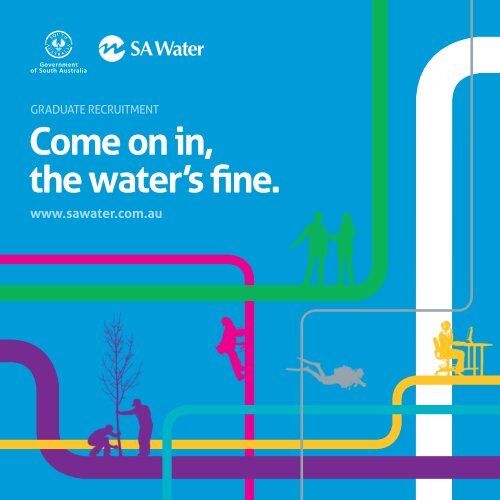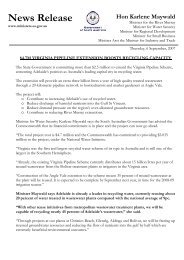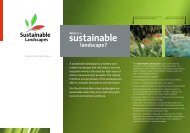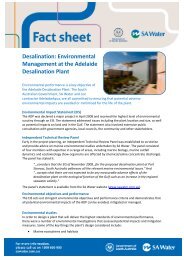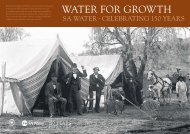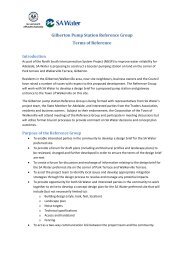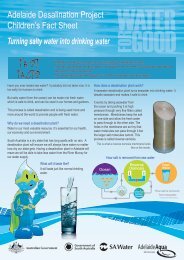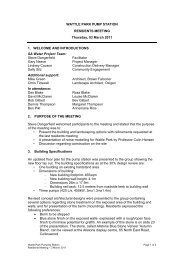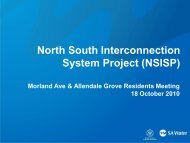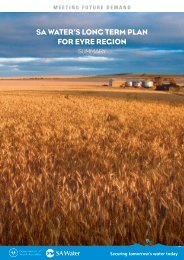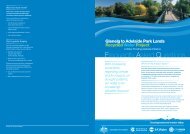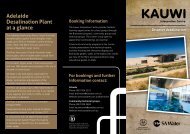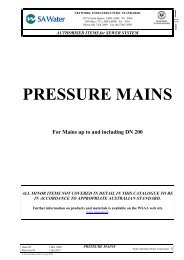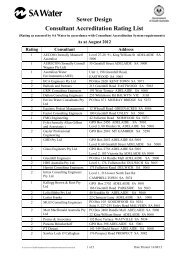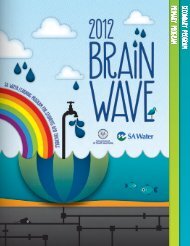Graduate Program Brochure - SA Water
Graduate Program Brochure - SA Water
Graduate Program Brochure - SA Water
- No tags were found...
You also want an ePaper? Increase the reach of your titles
YUMPU automatically turns print PDFs into web optimized ePapers that Google loves.
graduate recruitmentCome on in,the water’s fine.www.sawater.com.au
Big careeropportunitiesOur graduateprogramAt <strong>SA</strong> <strong>Water</strong> we are actively working towardsa sustainable future for South Australia.At <strong>SA</strong> <strong>Water</strong> we’re deeply committed to protecting andmanaging South Australia’s most precious resource – water.With over 1500 dedicated staff ensuring safe and efficientwater and wastewater services to almost 1.5 million SouthAustralians, our expertise in water quality is recognisedaround the globe.As part of our commitment to sustainability we actively supportand help our people realise and achieve their potential.There has never been a better time to consider becominga part of <strong>SA</strong> <strong>Water</strong> as we meet new challenges and planfor a secure future for South Australia.We offer a high profile, structured yet flexible two year<strong>Graduate</strong> <strong>Program</strong> that allows participants the opportunityto undertake six to twelve month project assignmentsfor the duration of the program. In addition, participantsundertake extensive training in a range of areas includingwater quality awareness, presentation skills, projectmanagement and negotiating and influencing.Other key programfeatures include:• Continuous training and development• Excellent work life balance• The opportunity to learn from leadersin the water industry• A dedicated mentor• Health and wellbeing program• Regional placement opportunities.
Big opportunitiesfor graduatesWe are seeking…Innovative, confident and creative graduates who arekeen to pursue diverse and rewarding careers in thewater industry. We are looking for graduates froma wide variety of disciplines who can adapt, initiateand implement projects of strategic significance andcommunity importance.Degrees | DisciplinesTo meet our future business needs, we are seeking applicationsonly in the following disciplines for our 2014 intake:Engineering: Civil | Structural | Chemical | Electrical | MechanicalScience: Pure SciencesIT: Computer & Information Science
Engineering<strong>Graduate</strong>…AlysonCivil and EnvironmentalEngineering‘Rotations offered as part of the <strong>SA</strong> <strong>Water</strong> <strong>Graduate</strong><strong>Program</strong> provided me with the opportunity to undertakemeaningful work placements in a variety of different areasin the business. I used this opportunity to become involvedin project work which exposed me to many differentbusiness groups (operations, environmental management,procurement) and external organisations, and allowed meto get out on site and get my hands dirty! I was able toexplore the different business groups and find the areawhich I was most suited to and enjoyed, then pursue as acareer path. Through working in different groups I developeda range of different technical and non-technical skills whichincreased my confidence and networks through the business.“I received a lot of supportfor career planning anddevelopment throughdiscussions about where I wantto go and how I can get there.”As part of the <strong>SA</strong> <strong>Water</strong> <strong>Graduate</strong> <strong>Program</strong> we are giventhe opportunity to present our work to the businessincluding the CEO and Senior Management Team.This is great exposure for the graduates and allowsus to promote our work and achievements.The <strong>Graduate</strong> <strong>Program</strong> also runs a fantastic trainingschedule which developed my skills in presenting,business writing, negotiation and project managementwhich are very relevant to my chosen career path.’
Science<strong>Graduate</strong>…ChristyChemistry‘As a part of <strong>SA</strong> <strong>Water</strong>’s <strong>Graduate</strong> <strong>Program</strong>, I was giventhe opportunity to work in the Product Testing Laboratoryin the Australian <strong>Water</strong> Quality Centre (AWQC), whichprovides leading international laboratory services. I wasinvolved directly with developing and evaluating a newexperimental method, which was designed to achieve higherquality of testing and improved time and cost efficiency.One of <strong>SA</strong> <strong>Water</strong>’s key values is to “Seek and apply betterways” and the business unit has truly put a strong focuson research and development of novel technologies.The project I have taken part in is one of the manyopportunities for graduates and staff to work as a teamcreating innovative ways to improve laboratory operations.Moreover, another of <strong>SA</strong> <strong>Water</strong>’s key values,“Act in the best interest of customersand the community”, is also lived out inmaintaining our position as a leader inAustralia’s water quality managementto meet customers’ changing needs.’“I now realise that small changescan make a huge difference.”
page 6NETC CircuitSteve Wyborney (Continued from page 5)I felt a strong sense that the teachers werefree to explore the best of their strengths. Thisproved a powerful design for school success.Teachers who are confident, encouraged,empowered, and supported are likely to have afar greater impact than teachers who arerestricted and discouraged, and have littlefreedom to explore their strengths.I am amazed when discussions about howto make schools better bypass the fundamentalidea of allowing teachers room to learn byencouraging them to take productive risks.Learning requires risk taking, yet there is atrend in education today to eliminate risk takingso that “learning” will be more efficient.It seems to me that teachers who are experiencinglearning themselves will be far betterat understanding the learning process of theirstudents. I think that the best learning is riskyand the best teaching is characterized by highlevels of trust in the process.Unfortunately, our schools have beenforced to become increasingly focused on standardizedtesting to the point that instead of ourschools serving students and families, our studentsnow serve the schools through their testperformances. To me as a teacher, the qualityof each student’s learning experience is far moreimportant than their test score.Collaboration Is KeyOne of the strongest influences on my teachinghas been our K–1 team. This team consists ofteachers who are dedicated to the powerfulcombination of full-day kindergarten with aSteve makes learning come alive, which has a greatimpact on all the kids in his classroom. With math, inparticular, he takes the really hard-to-grasp conceptsand uses technology to manipulate them so that studentscan see the transformations. The way he uses thetechnology, students not only can hear it, write it, anddo it but they can also see it. This helps them grasp themeaning of the abstract concepts Steve is teaching.—Geno Bates, principal, Nyssa Elementary SchoolK–1 loop. The benefits of full-day kindergartenare undeniable. Students are less rushed, havemore time to explore and develop languageskills, and are far better known by their fulldayteachers who don’t have to teach 50 or 60students a day.Our entire school community has gainedprofound benefits from looping a teacheralong with his students for multiple years. Inour case, kindergarten teachers move up withtheir class to become the first-grade teacherthe following year. After teaching fourth gradefor seven years, I was given the opportunity toloop with my class and I have consideredmyself a fourth- to fifth-grade looping teacherever since. I find that when looping with students,I teach with a much clearer scope, anda far better understanding of my students.The insight into the curriculum I havegained from looping and the infusion of technologyhave refined my teaching skills anddriven my instructional practice.Technology Reinforces LearningI remember the specific moment 10 years agowhen I began my relationship with instructionaltechnology. I was teaching my firstfourth-grade class at Nyssa with an overheadprojector pen in my hand. Right in the middleof a lesson that was no doubt running awaywith me, I cranked the film roll on the overheadprojector to find more blank space towrite on. But there wasn’t any.Desperately, I cranked the roll backward,understanding that a lag could mean a loss inlesson momentum. As I was turning the roll,with the projector still on, images from past lessonswere rolling down the screen behind me. Iwould have considered it a distraction, and itreally was, but an amazing thing began to happen.The students began interacting with theimages from prior lessons as they rolled downthe screen. They began saying “I rememberthat!” and they even began calling out answersbecause some of the images posed questions. Iwas struck with the speed and the clarity withwhich the students returned to the learning fromthe original lessons represented by those images.I realized that the images were powerfulbecause they represented local learning experiences.While the images from the textbookswere useful, the images developed during ourlearning experiences were far more valuablebecause they represented both the idea and theparticular occasion of learning.I had always been fascinated by lessonpacing and momentum and at that moment Iwas struck with the realization that I could useimages to give myself, and my students, accessto prior learning experiences. I decided to callContinued on page 16
Business<strong>Graduate</strong>…AdrianEconomics‘The training provided throughout the <strong>SA</strong> <strong>Water</strong> <strong>Graduate</strong> <strong>Program</strong>has helped me build skills suitable in numerous areas, resulting innew opportunities opening up for me. Improved verbal, written andinterpersonal skills have assisted me to become a more confidentpublic speaker and effective communicator.This has enhanced the level of service I provide to my colleaguesand helped me build strong working relationships with a varietyof staff across <strong>SA</strong> <strong>Water</strong>. I’ve also learnt that communication is vitalto business and building professional relationships. The trainingprovided has helped me diversify my skills, ensuring I can besuccessful in a dynamic and fast-paced environment.’“The training provided has helped mediversify my skills ensuring I have theability to be successful in a dynamicand fast-paced working environment.”
Opportunity to applyHow to applyOnline at www.sawater.com.au/<strong>SA</strong><strong>Water</strong>/AboutUs/CareersTrainingWhen to applyFriday March 1st 2013, to Friday March 29th 2013.EligibilityAustralian citizenship or permanent residency.Where are placements located?<strong>Graduate</strong> placements are located across metropolitan Adelaide,outer metro and South Australian regional locations.Further informationwww.sawater.com.augraduate.recruitment@sawater.com.au


